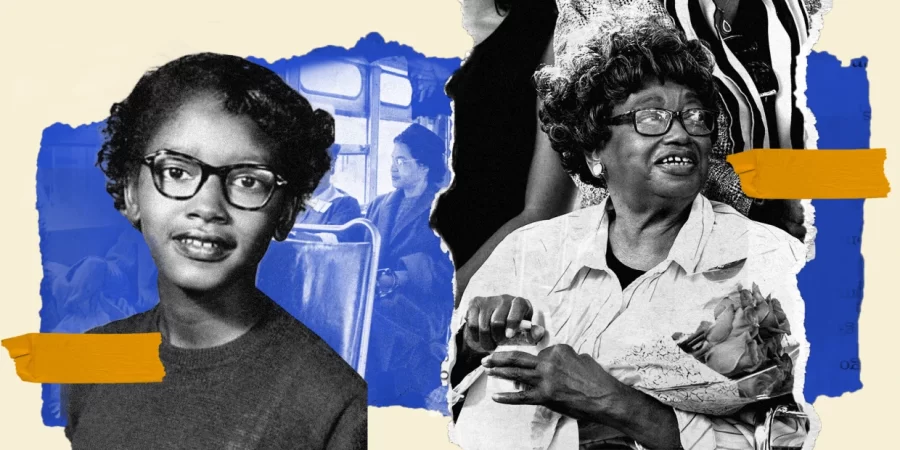WHM: Giving less-known influential women the recognition they deserve
Claudette Colvin did exactly what Rosa Parks is best known for- only it was nine months earlier and she was only 15. Photo courtesy of MSNBC News
March 30, 2023
Throughout March, we celebrate the achievements of both historical and present-day influential women. Not only recognizing the ways in which they have impacted society, but also to inspire future female leaders and innovators in our country. However, the nationwide celebration of this holiday nationwide is a relatively new development in history; the contributions of certain women were often considered only at the local level, within their communities.
In 1978, The Education Task Force of the Sonoma County Commission on the Status of Women in Santa Rosa, California dedicated the week of March 8 (in correspondence with International Women’s Day) as Women’s History Week. Over time, other communities across the nation began their own celebration of Women’s History Week. As more and more municipalities embraced the week-long designation, a group of advocates led by the National Women’s History Project successfully pushed for national recognition of the holiday. In response, President Jimmy Carter issued a presidential proclamation that declared the week of Mar. 8, 1980 as Women’s History Week.
“I urge libraries, schools, and community organizations to focus their observances on the leaders who struggled for equality—Susan B. Anthony, Sojourner Truth, Lucy Stone, Lucretia Mott, Elizabeth Cady Stanton, Harriet Tubman, and Alice Paul,” Carter said in his statement.
Nearly a decade later, Congress passed a law that designated the entire month of March as Women’s History Month. Since 1995, each president has issued proclamations declaring the celebration of this holiday- President Biden just released his about a month ago.
Many American women such as Eleanor Roosevelt, Susan B. Anthony and Rosa Parks are recognized for their activism and significant contributions in American history; however, there are many other women who were active in women’s rights movements but are not as well known today. Some of them have been overshadowed or their stories haven’t been shared as widely. These lesser-known women still made huge strides, even if their names aren’t printed in history textbooks.
Mary Ware Dennet
Born in the late 19th century, Mary Ware Dennet was a suffragist and anti-war advocate who fought for the legalization of birth control. Dennet started her work as part of the Massachusetts Woman Suffrage Association before becoming the corresponding secretary of the National American Woman Suffrage Association, where she wrote several influential essays in favor of the movement.
Although Dennet and Margaret Sanger worked closely together to lead the birth-control reform movement in the 1920s, they had different ideas. Sanger believed that birth control should stay under the control of doctors, while Dennet believed it was a fundamental right. Sanger is one of today’s better-known reproductive rights leaders, but Dennet still made an impact on the movement.
Dennet founded the Voluntary Parenthood League (separate from Planned Parenthood), which focused on repealing anti-birth control laws. Unfortunately, her work with the organization led her to be arrested; Dennet was fined for her obscene work but refused to pay.
“If a few federal officials want to use their power to penalize me for my work for the young people of this country, they must bear the shame of a jail sentence. It is government which is disgraced, not I,” Dennet said.
Grace Hopper
Known for her contributions to computer programming and software development, Grace Hopper had many notable accomplishments throughout the course of her life. She earned her PhD and Masters in mathematics before becoming a math teacher at Vassar College, where she had once graduated with her bachelor’s degree. Hopper enjoyed her time while working in the Navy WAVES (Women Accepted for Voluntary Emergency Service).
“I’ve already received the highest award I’ll ever receive, no matter how long I live, no matter how many more jobs I may have. That has been the privilege and the responsibility of serving very proudly in the United States Navy,” Hopper said.
While in the Navy, Hopper worked on the first large-scale automatic calculator and wrote the first computer manual. She also invented the first computer compiler, co-developed one of the first standardized computer languages and was involved in the creation of the first digital computer, called the UNIVAC.
All of Hopper’s accolades led her to be recognized internationally. She was the first woman to be named a “distinguished fellow” of the British Computer Society and was awarded the National Medal of Technology in 1991. After her death, Hopper was also granted the Presidential Medal of Freedom. As the number of women in STEM has grown over the last 40 years, Grace’s many inventions have continued to be useful to others in the development of technology; programmers still use the COBOL programming language and computer compiler today. Hopper also continues to be a figure for many younger women and girls to look up to.
Claudette Colvin
Most people know the story of Rosa Parks and how she refused to give up her seat on the bus to a white passenger- however, Claudette Colvin did the same thing before Parks did.
In 1955, at age 15, Colvin was taking the bus home from school when the bus driver ordered her to get up. Colvin refused because she had already paid for her ticket and believed it was her constitutional right to stay seated. She was arrested.
“All I remember is that I was not going to walk off the bus voluntarily,” Colvin said.
Colvin later went to court and was one of four women plaintiffs in the Browder v. Gayle case, which eventually led to the overturning of the bus segregation laws in Alabama. Although she made a large impact at such a young age, Colvin’s brave actions are forgotten because she wasn’t seen as reliable as an icon as Rosa Parks was. Black organizations at the time felt that Colvin was too young to be taken seriously and didn’t have the reputation that Parks did as the secretary of the NAACP. Colvin also says that one of the reasons she wasn’t as recognized was because Parks had better hair and overall a better “look” for her role.
“Her skin texture was the kind that people associate with the middle class,” she said.
There is hope amongst people today that Colvin’s story will spread and get more traction. With the ongoing racial issues in society, some think that what happened to Colvin when she was 15 will resonate with teenagers today. Claudette Colvin: Twice Toward Justice, written by Phil Hoose, attempts to raise awareness about Colvin’s story and inspire younger audiences.
As we close out Women’s History Month it is important to reflect upon the lasting impact these great women have had on being a woman in the modern day. From gender equality to reproductive freedom to origins of modern-day computers, these leaders deserve to be recognized and celebrated. They inspire young girls and motivate other women to lead and contribute to society. Although many women are oftentimes overshadowed or overlooked, they still make equally impactful contributions to their counterparts and deserve to be celebrated.









